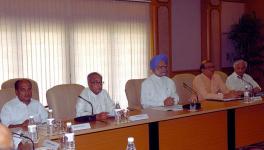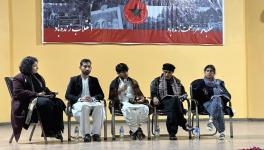The Idea of India Needs Constant War
‘What is India? Tell us more about it,’ - as a social scientist based in India as much as in Europe, I am often asked this question. I believe many of my colleagues have similar experiences as well. Talking about India, I am baffled – what exactly is India. Is it a landmass? Is it a culture? Is it a people? Does India have any singularity that extends all across its spaces? By definition (although never a big fan of compartmentalising tendencies of ‘definitions’), nations emerge out of common culture/religion/language etc. Examples are plenty to support this –Bangladesh, Pakistan, Israel and so on. In other cases, nations also emerge through common political goals – to fight against an external enemy. Here, India figures as it emerged out of the colonial struggle. Needless to say, India is a colonial construct. As a result, internal conflicts and identity assertions based especially on language has never ceased. Unity in diversity is a myth, a myth that holds the imagination of the nation together.
In the context of the present situation when India’s federalism is at stake under the idea of Hindu Rashtra, it becomes apparent that India can survive as a single landmass only if the federal structure is upheld. In view of that, diversity and not unity has to be the goal. Otherwise states will continue to secede and a day will come when there will actually be no India. However, celebration of federalism is unlikely under the present political culture in the country underscored by an aggressive drive towards homogenisation of cultures, languages and identities. Federalism can be achieved if India reconstructs itself and emerges as the United States of India. Otherwise, every step towards nation-building feels like an insistence.
However, to hold the nation together, that inherently lacks much things in common, it is a master stroke from the Bharatiya Janata Party under Modi to constantly weave narratives revolving around a common enemy outside. People in conflict with each other can only stay together at the face of an external threat – whether real or fabricated. To combat the enemy within i.e. the very idea of nationhood that has become larger-than-the-people-it-should-stand-for, we ought to create an enemy outside – Pakistan is a constant while China is the new entrant. After all, what’s there for Odiyas to connect with Marathis apart from a common hatred towards Pakistan – India’s enemy! The BJP is a visionary, they see this very well – that the idea of India can now only survive and thrive through forced homogenisation, aggressive singularisation and imposition of a monolithic future plan.
Consequently, the need of the hour is to become not just ahistorical, but anti-historical. The point is simple – to dismiss diversity and impose unity, at any cost. When Amit Shah says that anti-nationals should go to Pakistan, what he actually means is stay here and join us in hating Pakistanis. When the government allows mob lynching, it encourages violence against ‘the other’ in its mission towards unity with no diversity. Here, one also has to remember that the idea of nationhood is built around territoriality, and not about people. Therefore, it is Kashmir that India so desires, not the Kashmiris. It is the Northeast that India would not like to let go off, but never shy away from name-calling its people.
In view of the continued violence against dissent under Modi’s second term as the prime minister of the Indian state, one is compelled to dread about the extent to which the BJP government plans to go to shove unity under India’s throat. Concomitantly, one is compelled to wonder – can India ever achieve federalism in true sense? Otherwise, do we really need such forced assimilation; more importantly, at what cost? After all, how many lives must a nation sacrifice before we can stop calling it one? The answer is blowing in the wind, but who’s ready to listen?
The writer is a researcher on Indo-German migration at University of Cologne. The views are personal.
Get the latest reports & analysis with people's perspective on Protests, movements & deep analytical videos, discussions of the current affairs in your Telegram app. Subscribe to NewsClick's Telegram channel & get Real-Time updates on stories, as they get published on our website.























